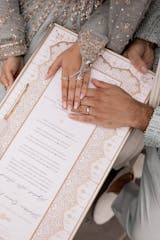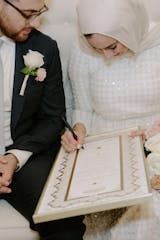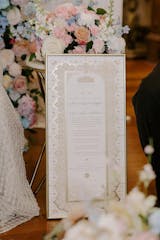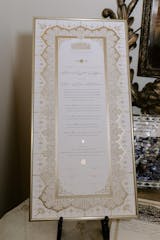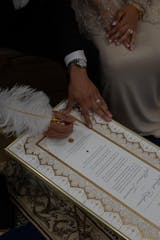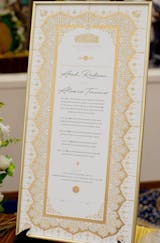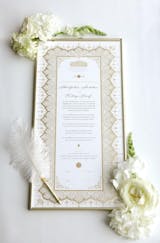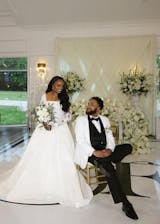Muslims see marriage as a bond of affection and commitment. However, marriage is also a contract that the bride and groom formally offer and accept. Their acceptance of the contract indicates that they agree to certain rights and obligations.
In the West, a Muslim marriage contract is a private document that has religious and moral power in a couple’s private life.
Basic VS Extended Marriage Contracts
A Muslim marriage contract does not have to be written on paper. The contract can be made simply through oral agreement. However, it has become common for people to get a marriage certificate that confirms their contract. These certificates usually include the signatures of the bride, the groom, and the people who witness their agreement. Some certificates also say how much dower (mahr) the groom will give to the bride. This is a basic Muslim marriage contract. Raeesa Studio provides nikah contracts with the basic requirements and Mahr that you can customize here.
A basic Muslim marriage contract may be expanded. It can draw on Muslim law to include additional declarations about the rights and obligations in the marriage. Expanded contracts define and protect the rights and obligations of each spouse more fully than a simple basic contract. Muslim marriage contracts that are more expanded are especially useful in helping to protect the rights of the wife. In the past, Muslim women have used expanded marriage contracts to define some of the terms of their marriage. Families have used expanded marriage contracts to guarantee rights for their daughters. Expanded contracts are widely used today, both privately and in the legal systems of many Muslim-majority countries. The right to draw up an expanded Muslim marriage contract is sometimes considered one of the rights of women in Islam.
(CCMW, Muslim Marriage Toolkit)
A Complete Guide to Understanding the Muslim Marriage Contract and Its Importance in Islamic Law
During the No Religious Arbitration debate, the Canadian Council of Muslim Women (CCMW) came across some women wishing to deal with family matters in accordance with the traditions of their faith. Realizing the need, CCMW published a Marriage Contract toolkit which allows women to develop a marriage contract in keeping with Muslim and Canadian family laws.
Rooted in traditional Muslim laws, the sample contract incorporates rights guaranteed to women and suggests ways to increase equality between husband and wife.
CCMW's kit is the result of 6 years of deliberation. It has been researched & developed by Professor Lynda Clarke, a respected Islamic scholar. This kit also draws upon the expertise of Pam Cross, a feminist lawyer who has worked on women’s equality issues for many years.
Download the extended Muslim marriage contract here.
How to use the extended sample contract:
• You may want to use the contract as it is, sign some parts of it and cross out others, or write your own version.
• Remember that you will need two copies of your Muslim marriage contract, one for each spouse.
• Each spouse should consult a lawyer.
• When your contract is ready, both copies should be signed, dated and formally witnessed.
• Have both copies of the contract notarized or commissioned. Make sure that you follow the local laws about having a contract notarized or commissioned.
• Keep your copy of the contract in a safe place.


